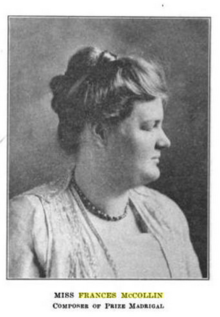Frances McCollin

Frances McCollin (October 24, 1892 — February 25, 1960) was an American composer and musician, who was blind from early childhood. She was the first woman to win the Clemson Prize from the American Guild of Organists. In 1951, she was named a Distinguished Daughter of Pennsylvania.
Early life and education
Frances McCollin was born in Philadelphia, Pennsylvania in 1892, the daughter of Edward Garrett McCollin and Alice Graham Lanigan McCollin. Her father, a lawyer, had studied musical composition in college, and he wrote and performed music as a side interest throughout his life.[1] Her grandfather, George T. Lanigan, was an Irish-Canadian poet and journalist. Her younger sister Kitty McCollin was a singer and composer.[2]
When Frances McCollin was five years old, she became blind, probably from congenital glaucoma.[3] Her parents and extended family took an energetic approach to her education at home, focused on music. When she started to compose in girlhood, her father was her first teacher and transcriber. As a child, she described sensations consistent with synaesthesia, associating musical keys and colors (green for E major, pink for F major, for example).[2] As a young woman she studied with fellow blind musician David Duffield Wood,[4] the organist at St. Stephen's Church in Philadelphia,[5] and at the Pennsylvania Institute for Instruction of the Blind.[6]
Career
In her lifetime, McCollin's works were performed frequently by professional and amateur vocal ensembles, and by orchestras including the Philadelphia Orchestra, the Warsaw Philharmonic, the Vancouver Symphony, and others. She met Marian Anderson, Igor Stravinsky, Amy Beach, and other musicians and composers, usually in connection with her mother's work with the Philadelphia Orchestra. Fabien Sevitzky, Eugene Ormandy, and Leopold Stokowski took particular interest in her compositions.[2] McCollin defended Stokowski programming The Internationale for a Philadelphia youth concert in 1934.[7]
Among the honors McCollin won were a first prize from the Manuscript Music Society of Philadelphia in 1916, and the Philadelphia Matinee Musical Club's annual prize in 1918. Also in 1918, she became the first woman to win the Clemson Prize from the American Guild of Organists, and the Kimball Company Prize from the Chicago Madrigal Club.[8] In 1931 her composition "Spring in Heaven" won the Federation Prize from the National Federation of Music Clubs.[9] In 1951, she was named a Distinguished Daughter of Pennsylvania.[10]
She gave popular weekly lectures about the Philadelphia Orchestra programs, in which she focused on explaining modern compositions. She also hosted a weekly radio show for children, the "Aunt Frances Music Hour." She conducted a girls' choir at the School for the Blind in West Philadelphia, and the Girls' Glee Club at Swarthmore College one year (1923-1924).[2] In 1943, the Philadelphia Orchestra's "Request Program" featured works voted into the program by the public; Frances McCollin's "Pavane" was included as a top vote-getter, the only winning composition by a woman.[11]
Personal life
McCollin was in poor health in her last years, and lived with her sister Kitty (who had married a doctor, John Hancock Arnett[12]). When she died in 1960, aged 67 years, members of the Philadelphia Orchestra played a string quartet she composed at her memorial service.[2]
Her scores and other papers are archived at the Free Library of Philadelphia.[6] Another collection of her papers are at the University of Pennsylvania.[13]
References
- ↑ Edward G. McCollin Collection, University Archives & Research Center, University of Pennsylvania.
- 1 2 3 4 5 Annette Maria DiMedio, Frances McCollin: Her Life and Music (Scarecrow Press 1990). ISBN 9780810822894
- ↑ Clifford E. Olstrom, Undaunted by Blindness (eBookIt.com 2012). ISBN 9780982272190
- ↑ "Hear Prize Cantata; Philadelphia Club Performs Work of Blind Woman Composer" Musical America 29(November 23, 1918): 25.
- ↑ "David Duffle Wood: An Editorial" Outlook for the Blind 8(1915): 104.
- 1 2 "Frances McCollin" in Mary F. McVicker, Women Opera Composers: Biographies from the 1500s to the 21st Century (McFarland 2016): 118. ISBN 9781476623610
- ↑ "Stokowski Under Fire for Plan to Play 'Red' Song" Evening Times (January 27, 1934): 1. via Newspapers.com

- ↑ "Woman Wins Noted Kimball Company Prize" Musical Monitor 8(4)(December 1918): 168.
- ↑ "Clubwomen Plan Aid Native Music in Future Programs" Corsicana Daily Sun (October 14, 1931): 11. via Newspapers.com

- ↑ "Ten State Women Are Honored for Achievements" Pittston Gazette (October 12, 1951): 1. via Newspapers.com

- ↑ Miles Kastendieck, "Contemporary Composers Finally Break Through in Vote for Request Program" Brooklyn Daily Eagle (May 2, 1943): 32. via Newspapers.com

- ↑ "John Hancock Arnett" New York Times (November 22, 1985).
- ↑ Frances McCollin Papers, University of Pennsylvania, Kislak Center for Special Collections, Rare Books and Manuscripts.
External links
- An audio sample of McCollin's setting of "In the Bleak Midwinter", from the Elektra Women's Choir website
- The score for "The Singing Leaves" (1918), a cantata by Frances McCollin for women's voices, text by James Russell Lowell